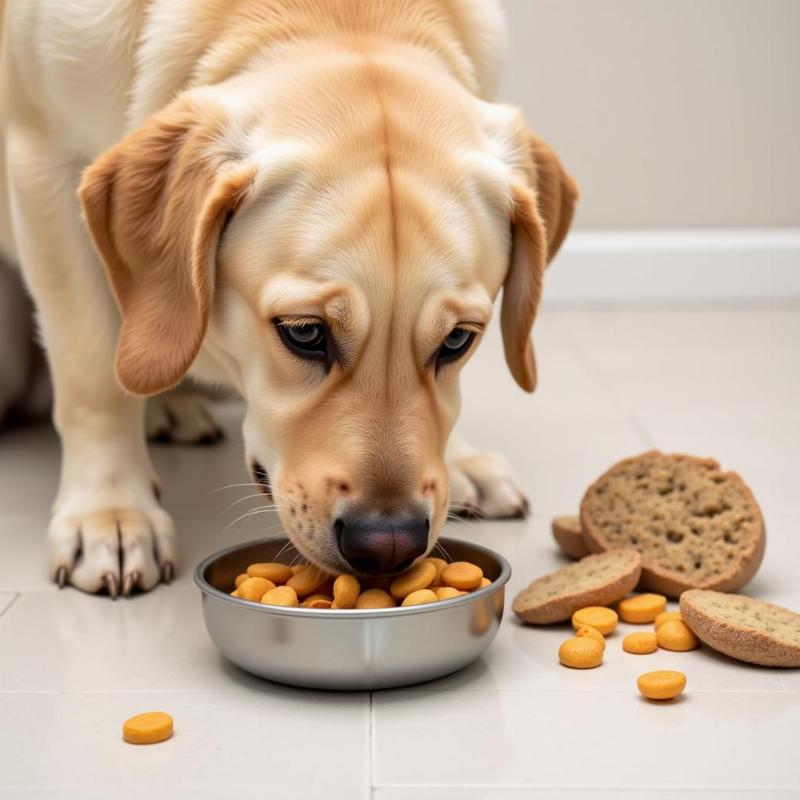Choosing the right food for your aging Labrador Retriever is crucial for maintaining their health and happiness in their golden years. Senior Labs have different nutritional needs than younger dogs, and “best dog food for senior labs” is a common search term for owners seeking to provide the best care. This article will guide you through selecting the optimal diet for your senior Lab, considering factors like joint health, weight management, and digestive sensitivity.
Understanding the Nutritional Needs of Senior Labs
As your Lab ages, their metabolism slows down, and they become less active. This often leads to weight gain, which can exacerbate existing health issues like arthritis and hip dysplasia. Therefore, a senior Lab’s diet should be lower in calories and fat than a younger dog’s. Simultaneously, it needs to be rich in high-quality protein to maintain muscle mass and support their immune system.
Key Ingredients to Look for in Senior Lab Food
Look for dog foods specifically formulated for senior dogs, with ingredients that address the common health concerns of aging Labs. Glucosamine and chondroitin are essential for supporting joint health, while fiber aids in digestion. Antioxidants, such as vitamins E and C, can help protect against cellular damage and boost the immune system. Omega-3 fatty acids, found in fish oil, can help reduce inflammation and improve cognitive function.
Best Dry Dog Food for Senior Labs
Dry dog food is a popular choice for senior Labs due to its convenience and dental benefits. Look for kibble that is appropriately sized for older dogs, as some may have difficulty chewing larger pieces. Some excellent options available in the US market include brands like Purina Pro Plan Bright Mind, Hill’s Science Diet Adult 7+, and Royal Canin Labrador Retriever Adult 8+. Always check the ingredient list to ensure it meets the specific needs of your senior Lab.
Best Wet Dog Food for Senior Labs
Wet food can be a great option for senior Labs who have difficulty chewing dry kibble or who are picky eaters. It often has a higher moisture content, which can help keep them hydrated. Look for wet foods that are complete and balanced, meaning they provide all the necessary nutrients for a senior dog. Brands like Blue Buffalo Homestyle Recipe Senior and Wellness Complete Health Senior are good options to consider.
How to Transition Your Senior Lab to a New Food
 A senior Labrador Retriever transitioning to a new type of food
A senior Labrador Retriever transitioning to a new type of food
Switching your senior Lab to a new food should be done gradually to avoid digestive upset. Start by mixing a small amount of the new food with their current food, gradually increasing the proportion of new food over several days. Monitor your dog for any signs of digestive issues, such as vomiting or diarrhea, and consult your veterinarian if you have any concerns.
What to Avoid in Senior Lab Food
Certain ingredients should be avoided in senior Lab food, such as artificial colors, flavors, and preservatives. Fillers like corn and wheat can also be difficult for some dogs to digest. High levels of sodium can exacerbate heart and kidney issues. Always read the ingredient list carefully and choose foods with high-quality, natural ingredients.
Conclusion
Choosing the best dog food for your senior Lab requires careful consideration of their individual needs and health conditions. By understanding their nutritional requirements and selecting a high-quality food, you can help your beloved companion enjoy their golden years to the fullest. Remember to consult with your veterinarian to determine the ideal diet plan for your senior Lab. “Best dog food for senior labs” offers a starting point in your research, and this guide will further equip you with the knowledge to make the best decision for your furry friend.
FAQ
- How often should I feed my senior Lab? Most senior Labs do well with two smaller meals per day.
- What are the signs of food allergies in senior Labs? Common signs include itching, skin rashes, gastrointestinal upset, and ear infections.
- Can I give my senior Lab supplements? Yes, but consult with your veterinarian first to determine the appropriate supplements and dosage.
- How much weight should my senior Lab gain or lose? Maintain a healthy weight for your senior Lab based on their breed standard and individual needs. Consult your vet for personalized advice.
- Is it okay to give my senior Lab table scraps? While occasional treats are fine, avoid giving your senior Lab table scraps regularly as they can be unhealthy and contribute to weight gain.
- How can I encourage my senior Lab to eat if they have lost their appetite? Try warming their food, adding a small amount of low-sodium broth, or switching to a more palatable food.
- What are the signs my senior Lab’s food isn’t working for them? Look for changes in appetite, weight, stool consistency, coat condition, and energy levels.
Related Articles on Beautdogs.us
best dry dog food for a labrador
Beautdogs.us is your premier online destination for all things dog-related in the US. We offer expert advice on dog breeds, care, and products, catering to both new and experienced dog owners. Our team of experts is passionate about providing valuable and trustworthy information. Whether you’re looking for breed-specific advice, training tips, or product reviews, Beautdogs.us has you covered. Contact us for personalized support: Email: [email protected], Phone: +1 501-555-7529.